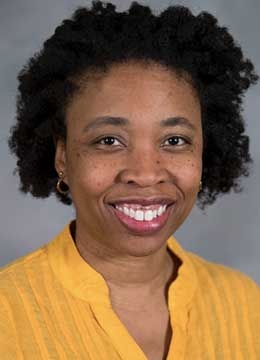Q&A with Founding Director of RIC’s New Education Policy Institute
- News & Events
- News
- Q&A with Founding Director of RIC’s New Education Policy Institute

Last year, the State of Rhode Island assumed control of Providence public schools after decades of low performance. As policy decisions get underway, the expertise of Adrienne Goss has been tapped by community leaders and organizers.

Goss is an assistant professor of social and educational policy and author of the "Rhode Island Education Policy Primer," which highlights long-standing inequities in Rhode Island's education system that directly impact nonwhite, low-income, emergent bilingual and special needs students. Each chapter of Goss' primer gives an overview of how public education operates in Rhode Island and ends with recommendations.
Goss is also founder of the Social Policy Hub for Equity Research in Education (SPHERE) at Rhode Island College, housed within the Feinstein School of Education and Human Development. SPHERE's mission is to engage faculty and students in research on educational practices and policies that advance equity and justice for Rhode Island schoolchildren.
What have been SPHERE's initiatives thus far?
One of our first initiatives was a Faculty Fellows Program, which provides an opportunity for education faculty to leverage their research to inform policymakers in Rhode Island, including the Rhode Island General Assembly and the Rhode Island Department of Education. SPHERE will be releasing some of the fellows' work this year. I hope to expand this program, as well, to faculty in other divisions across the college in the coming years.
You are also developing curriculum and courses in social and educational policy. Can you talk about those?
I created a graduate-level course called "Youth Social Policy and Action," which I am teaching in the Feinstein School of Education's Youth Development Program. This course examines connections between policy and the lives of young people. Focus is on how youth have used activism to impact public policy. I'm also on the URI/RIC joint Ph.D. program committee, which is working to reimagine curriculum and program requirements for the joint Ph.D. in education.
As the state works to improve Providence public schools, who should be at the policy table?
Parents, families, teachers and students. They are directly affected by the policy decisions that get made.
Your primer highlights long-standing imbalances in the educational system that unduly affect nonwhite, Hispanic, low-income and emergent bilingual students and students with disabilities. Why have these populations, in particular, had such a long history of inequities?
I think the better question is why have white, middle- and upper-class, English-speaking students without disabilities been the primary beneficiaries of our educational system? What social and educational policies have given them an advantage?
What is the most important thing we can do to improve student achievement among low-income students?
Mitigate the effects of poverty. The policies we make around housing, health care, child care, etc. can often exacerbate poverty and outweigh the effects of education policy. If we really want to improve schools for low-income children, we need to make targeted investments in the social supports that help them come to school ready to learn.
